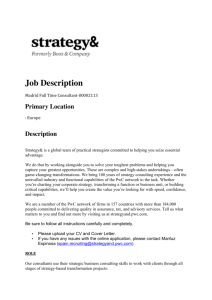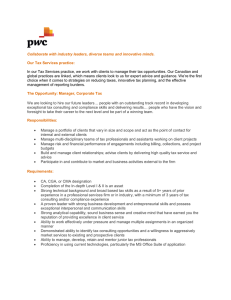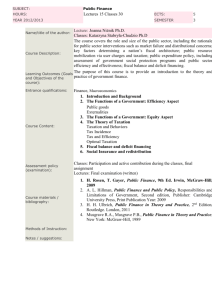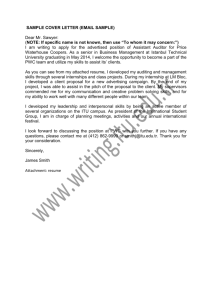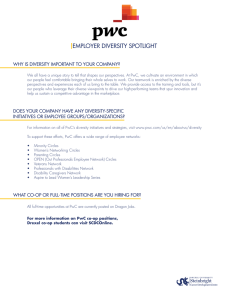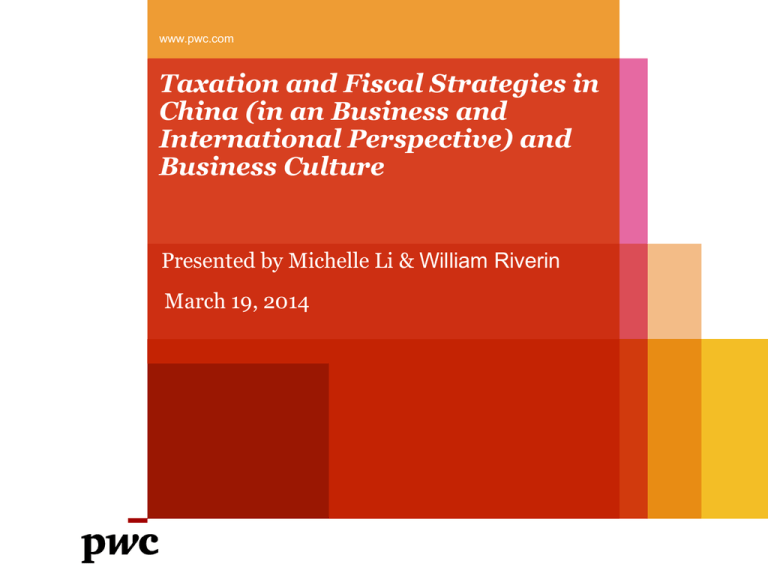
www.pwc.com
Taxation and Fiscal Strategies in
China (in an Business and
International Perspective) and
Business Culture
Presented by Michelle Li & William Riverin
March 19, 2014
Agenda
1.
An overview of China domestic taxes for consideration, including corporate
income taxes, turnover taxes, other tax concepts, and tax administration.
2.
Some discussions from international tax perspectives:
3.
4.
−
what are typical investment vehicles in China;
−
what are typical options of operations in China; and
−
how to structure the operation and activities in China for a Canadian corporation.
Some discussions from business strategy perspectives:
−
new leadership, new agenda for growth, new political environment and landscaping in China;
−
free Trade Zone/ Free Trade Area in Tianjin, Shanghai, and Other Provinces;
−
coming up with the strategies for the market entry and growth in China;
−
observation and recommendations - government relations regulatory compliance;
−
observation and recommendations - managing risks;
Quick Tips re: Chinese business culture
Taxation and Fiscal Strategies in China (in an Business and International Perspective) and Business Culture
PwC
March 2014
2
An Overview of Taxes for Consideration
The People’s Republic of China levies a wide range of taxes as follows:
Income Taxes
• corporate income tax (CIT)
including withholding
income tax(WHT); and
• individual income tax(IIT).
Turnover Taxes
• value added tax (VAT);
• business tax (BT);
• consumption tax (CT); and
• custom duty (CD).
Property and Behavior Taxes
• real estates tax (RET);
• land appreciation tax (LAT);
• arable land occupation tax (A
LOT);
• urban and township land-use
tax(UTLUT);
• deed tax(DT);
• stamp duty (SD);
• custom duties(CD); and
• Other type of taxes including
motor vehicle acquisition tax,
vehicle and vessel tax, resource
tax, urban construction and
maintenance tax, vessel tonnage
tax and tobacco tax.
Taxation and Fiscal Strategies in China (in an Business and International Perspective) and Business Culture
PwC
March 2014
3
Corporation Income Taxes (CIT)
• A tax resident enterprises (TRE) is subject to corporation income tax on their world wide
income.
• A non-TRE that has no establishment or place in China is taxed only on its China-source
income. A non-TRE with establishment or place in China shall pay CIT on income
derived by such establishment or place from sources in China as well as income from
outside China which is effectively connected with such establishment and place.
• Standard corporate tax rate in China is 25%, and there is no income tax at provincial
and local level.
• A lower income tax rate is available for the certain sectors/industries as follows:
−
Qualified new/high tech industries that meet the prescribed criteria and be subject to an assessment 15%.
−
Integrated Circuit (IC) production enterprise with a total investment exceeding RMB 8 billion, or which
produce integrated circuit with a line-width of less than 0.25 micrometer - 15%.
−
Key software production enterprises that meet prescribed criteria and be subject to an assessment - 10%.
−
Qualified technologies-advanced service enterprises in 20 cities such as Beijing, Shanghai, Tianjin,
Guangzhou, and Shenzhen, etc.) - 15%. This incentive is only available certain technology-advanced
service section members and meet prescribed criteria and be subject to an assessment.
−
Qualified small and thin-profit enterprises that fulfil certain conditions - 20%.
Taxation and Fiscal Strategies in China (in an Business and International Perspective) and Business Culture
PwC
March 2014
4
Turnover Taxes
Value-added tax (VAT)
•
Sales and imported goods as well as repair, replacement, and processing services are subject to VAT.
•
Standard tax rate: 17% ; Small-scale taxpayer: 3%.
•
The sales of necessity goods may be subject to a reduced tax rate of 13%.
•
Effectively starting from Jan 1, 2009, the VAT system is a consumption-based VAT system, which means that
input VAT on fixed assets is fully recoverable except for situation specified in VAT regulations.
•
Exported goods from China may be eligible for a refund that ranges from 0 -17% for the VAT incurred on
materials purchase domestically. There is a prescribed formula for determine the amount of refund.
Business Tax (BT)
•
Imposed on services, transfer of intangible assets and immovable property taken place within China. Starting
from 2009, services taken place in China refer to either service providers or service recipients in China;
thus, a business rendered outside of China may be subject to business tax in China.
•
Business tax rate ranges from 3-5% except for the entertainment industry may be up to 20%.
•
Business tax is not recoverable but it is deductible for income tax purposes.
Consumption Tax (CT)
•
Imposed on 14 categories such as cigarette, alcoholic beverage and certain luxurious and unfriendly items.
•
Computed on sales amounts or sale s volumes.
Taxation and Fiscal Strategies in China (in an Business and International Perspective) and Business Culture
PwC
March 2014
5
Other Tax Concepts For Consideration
•
Branch Income
A branch of a non-TRE in China is taxed at branch level. If more than one branch, can elect to file their taxes at the
main office in China on a consolidated basis. No further tax upon remittance of branch profits.
•
Group taxation
Not permitted under CIT law unless otherwise prescribed by the State Council.
•
Transfer price regime
•
Thin-capitalization rules
Interest arising from excessive related party loans could be disallowed. The safe harbor debt to equity ratio for
enterprises in the financial industries (5:1) and other type of industries (2:1). If sufficient evidence to show that the
financing arrangement is at arm’s length, these interests may be deductible.
•
Controlled foreign corporation (CFC) rules
Undistributed profits of CFCs located in low-tax jurisdictions with an effective tax rate of less than 12% may be taxed
as a deemed distribution.
•
Tax incentives, investment tax credit, and other incentives
Predominant-industry oriented, limited geography-based tax policy. Exemption or reduction for agriculture, forestry,
animal-husbandry, and fishery products. Tax holidays for specified basic infrastructure projects, environmental
protection/energy water conservative projects, qualified new/high tech enterprises, newly established software
production enterprises, integrated circuits design enterprises, and qualified energy-saving enterprises.
•
Withholding taxes
Taxation and Fiscal Strategies in China (in an Business and International Perspective) and Business Culture
PwC
March 2014
6
Tax Administration
• Annual return
• Payments of taxes
• Audit Circle
• Statute of limitation
• Recent focus of Chinese tax authorities
Taxation and Fiscal Strategies in China (in an Business and International Perspective) and Business Culture
PwC
March 2014
7
Typical Investment Vehicles
• Foreign companies, enterprises or individuals may subject to the approval from
Ministry of Commerce or other relevant ministries in order to establish business
in China by using the following investment vehicles:
− representative offices;
− wholly foreign owned enterprises (WFOE);
− foreign invested commercial enterprises (FICE); and
− Joint Ventures (JV).
• Certain bank, institutions, and insurance companies may subject to approval to
set up branch in China. Starting from March 1, 2010, foreign investor are
allowed to establish foreign invested partnership in China.
Taxation and Fiscal Strategies in China (in an Business and International Perspective) and Business Culture
PwC
March 2014
8
How to structure the operation and activities in
China for a Canadian corporation
General rules:
A Canadian corporation that expects to operate a business in a foreign country
should determine if its activities should be carried on through a foreign branch
operation (“Foreign Branch”) or by incorporating a foreign subsidiary corporation
(“Foreign Corporation”) in the foreign country:
Advantage and disadvantage to carries on in a foreign country through a Foreign
Branch or through a Foreign Corporation should be identified in order to take the
best business decision.
Taxation and Fiscal Strategies in China (in an Business and International Perspective) and Business Culture
PwC
March 2014
9
Advantages of a Foreign Corporation
• Desirable to operate a profitable operation in a low tax jurisdiction through a
Foreign Corporation;
• Repatriation of profit should be exempt of tax in Canada if certain conditions
are respected;
• The sale of shares of a Foreign Corporation may be exempt from foreign tax
pursuant to a tax treaty with Canada if the value of the shares is not principally
derived from real property in the foreign country;
• Foreign Corporation can provide limited liability to the Canadian corporate
shareholder;
• May be viewed as the more acceptable business vehicle in some countries; and
• The financial information to provide to the foreign jurisdiction would be limited
to the Foreign Corporation.
Taxation and Fiscal Strategies in China (in an Business and International Perspective) and Business Culture
PwC
March 2014
10
Disadvantages of a Foreign Corporation
• Not possible to use the operating losses of the Foreign Corporation against
Canadian domestic income of the parent corporation; and
• Might be subject to foreign withholding tax on payments of dividend.
Withholding tax rate might be reduced pursuant a tax treaty with Canada.
Taxation and Fiscal Strategies in China (in an Business and International Perspective) and Business Culture
PwC
March 2014
11
Advantages of a Foreign Branch:
• If losses are anticipated in a start-up period, operating losses can be used
against Canadian domestic income of the parent corporation;
• Branch remittances are not applicable to payments of dividend and hence
would not be subject to withholding tax by the foreign jurisdiction. However,
some foreign jurisdictions will impose a branch tax on profits not reinvested in
the business of the branch in the foreign jurisdiction; and
• If a foreign jurisdiction does not impose branch tax, it may be advantageous to
operate through a branch rather than a foreign subsidiary as the overall foreign
tax burden will be lower.
Taxation and Fiscal Strategies in China (in an Business and International Perspective) and Business Culture
PwC
March 2014
12
Disadvantages of a Foreign Branch:
•
Foreign business income earned by a Canadian corporation through a Foreign Branch is
subject to Canadian income tax at normal business tax. A foreign tax credit is provided for
the purpose of minimizing double taxation of the branch tax. Hence, if the foreign tax rate
is lower than the Canadian tax rate, the favourable tax advantage is lost;
•
If the foreign operation becomes profitable, there is no possibility to subsequently
incorporate the Foreign Branch on a tax-free rollover basis from a Canadian perspective;
•
It is undesirable to operate a profitable Foreign Branch operation in a low tax jurisdiction
as business profits will be subject to the higher Canadian tax rate regardless of whether
such profits are distributed to Canada (i.e., no possibility to defer Canadian taxation on
income until repatriation);
•
The ultimate sale of the Foreign Branch's assets will be subject to the foreign country's tax.
In contrast, a sale of the shares of a Foreign Corporation may be exempt from foreign tax
pursuant to tax treaty provisions; and
•
Foreign Branch should file an income tax return with the foreign jurisdiction, which
includes information about the parent corporation, such as accounts’ and directors’ names.
Usually this information is requested by the foreign jurisdiction to determine the business
profit reasonably allocated to the Foreign Branch.
Taxation and Fiscal Strategies in China (in an Business and International Perspective) and Business Culture
PwC
March 2014
13
Investment in China through HK
Key objectives of a tax-efficient financing structure:
•
Facilitate efficient funding to China, and repatriation of profits back to Canada;
•
Reduce taxable income in China otherwise subject to Chinese income tax;
•
Reduce global effective tax rate; and
•
Minimize withholding taxes on cross-border payments.
Taxation and Fiscal Strategies in China (in an Business and International Perspective) and Business Culture
PwC
March 2014
14
Investment in China through HK (cont’d)
Without UK
With UK
Canco
Canco
100%
Loan
100%
HK Co
Loan
Interest = 10%
PRC Co
Dividend = 10%
Interest = 7%
Dividend = 0%
100%
PRC Co
Taxation and Fiscal Strategies in China (in an Business and International Perspective) and Business Culture
PwC
Dividend = 5%
March 2014
15
Update on Canada-China Tax Treaty
China-Canada
(Current Treaty)
Hong Kong-Canada
(New Treaty)
Limitation of benefits
None
Yes – on interest, dividends
and royalties
Dividends: lowest rate
of withholding
10%
5%
Access to low rate of
dividend withholding
Beneficial owner must own
Beneficial owner must control
>=10% of votes of the dividend directly/indirectly >=10% of
payer
votes of the dividend payer
Interest on arm’s
length debt
Not subject to withholding tax
Not subject to withholding tax
Branch Tax
10%
5%
Branch Tax
Exemption
On first $500,000 of branch
profits
None
Taxation and Fiscal Strategies in China (in an Business and International Perspective) and Business Culture
PwC
March 2014
16
New Leadership, New Agenda for Growth, New
Political Environment and Landscaping
• New elected “fifth generations” leadership by 18th National Congress of Community
Country of China:
− Mr. Xi, Dr. degree of Law; and
− Mr. Li, Dr. degree of Economics.
•
Three key themes stands out:
− Restructuring the economy;
− Boosting the domestic demand; and
− Spurring green growth.
•
Investor should focus on growing domestic market and rising income as well as the green
projects and move the labor-intensive industries toward central and west part of the
Country.
•
In term of China future investment priorities, the government will provide greater
direction, more clarity on investment, and more incentives to invest in key industries:
advance manufacturing, high-and new-technologies industries; energy-saving and environmental
protections, modern services and inland province.
Taxation and Fiscal Strategies in China (in an Business and International Perspective) and Business Culture
PwC
March 2014
17
Free Trade Zone/ Free Trade Area in Tianjin,
Shanghai, and Other Provinces
•
Shanghai free-trade zone was launched in Shanghai, China on September 29, 2013. The
zone covers an area of 29 km2, integrating four existing bonded zones — Waigaoqiao Free
Trade Zone, Waigaoqiao Free Trade Logistics Park, Yangshan Free Trade Port Area and
Pudong Airport Comprehensive Free Trade Zone. It is seen as a testing ground for a
number of economic new reforms.
•
Tianjin Dongjiang Free Trade Port Zone was established on August 31st, 2006 by approval
of the State Council.
•
10+ Free Trade Zones/Free Trade Area have been approved by State of Council in China.
Purposes of Free Trade Zone/Free Trade Area
•
Explore new trade and investment model.
•
Boost and open up service industry.
•
Facilitate currency exchange liberalization for investment and trade.
•
Form an efficient and investor-friendly regulatory environments for business operation in China.
•
Upgrade and streamline the custom supervision framework , improve the operational efficiency for the logistics
companies operating in the FTZ, and therefore reduce the warehousing and logistic costs and enable the company to offer
their customers optimized logistic solutions.
Taxation and Fiscal Strategies in China (in an Business and International Perspective) and Business Culture
PwC
March 2014
18
Market Entry and Growth
Coming up with the best-fit strategy
• Work with the local partners to leverage resources such as sales channels, customer bases,
and low production costs.
• Identify the right local partner, align with their interests and fulfilling their strategy
intention, with assistance with external advisers, is often critical for market entry.
• Understand the difference in culture, customs and tradition and adopt a flexible market
entry strategy that can accommodate these differences, will go a long way in China.
• Identify the open and closed industries for foreign investors: encouraged, permitted,
restricted, and prohibited.
• Be nimble enough to response to changes in the fluctuating environmental and innovative
enough to approach China differently.
• Quote from Lazaro Compos, CEO of Swift:
“On business development, we would traditionally start with the standard product set and adapt to the
local needs. But in India and China, you need to forget the products that you got and start from scratch.
Start from what it is they need and build from there.”
Taxation and Fiscal Strategies in China (in an Business and International Perspective) and Business Culture
PwC
March 2014
19
Recommendation - Market Entry and Growth
• Make sure that a merge or acquisition is the best growth strategy and evaluate all
the options before proceeding.
• Perform adequate due diligence as earlier as possible in the deal process to
uncover deal and target risks.
• Identify the potential risk, putting them into the right context.
• Work with the experienced local adviser to leverage their experience and manage
key deal execution challenges, perform due diligence, assist with negotiation and
resolve the issues identified.
• Be flexible, patient, and persistent throughout the negotiation process to be
successful at doing deals.
• Post-merger integration need to be considered early on and carefully planning
with full management buy-in from both sides.
Taxation and Fiscal Strategies in China (in an Business and International Perspective) and Business Culture
PwC
March 2014
20
Observation and Recommendations - Government
Relations and Regulatory Compliance
Observation
• Foreign business cites a lack of access to government as one of significant risks.
• Secure the right connections in China necessitates a considerable commitment
of time and resources.
Recommendation
• Work collaboratively with government regulations and look for common
ground with government officials.
• Work with officials you are comfortable with and strive to maintain these
relationships; be consistent and persistent.
• Cultivate a wide network of local contacts.
• Trust partners or advisers with the right knowledge and local connections and
ensure your interests can be heard by the appropriate governments when they
need to be.
Taxation and Fiscal Strategies in China (in an Business and International Perspective) and Business Culture
PwC
March 2014
21
Observation and Recommendations - Managing
Risks
Observation:
• Company without insights into local business practices and culture finds
themselves wholly unprepared for the underlying risks.
• Global compliance policies, training and procedures have proven largely
inadequate in identifying red flags and assessing risk in China.
Recommendation:
• Adopt a holistic and China-specific risk management framework.
• Address both strategic drivers (i.e. growth and cost rationalization) and
sustainability drivers (i.e., business infrastructure and compliance) in risk
management.
• Appoint China-based senior management to lead compliance programs to
ensure they are proactive and effective.
Taxation and Fiscal Strategies in China (in an Business and International Perspective) and Business Culture
PwC
March 2014
22
Quick Tips - Business Culture
• Since Chinese culture has its richness and heritage, before approaching the
business in China, please be mindful for the following qualities and values:
- Saving and giving face
- Respect for elders and rankings (note that the latter is particularly important when dealing with government officials)
- Patience
- Politeness
- Modesty
• Pay attention to when people say “yes” but actually “no”.
• Identify who are intermediate persons and who are the decision makers.
• Find out the underlying and real purposes from interaction with Chinese
business people.
• Use “Guanxi” (i.e., network), a double-edged sword to secure favor in personal
relation.
• Useful link in the website of The Canada Trade Commissioner Service:
http://www.tradecommissioner.gc.ca/eng/document.jsp?did=107932
Taxation and Fiscal Strategies in China (in an Business and International Perspective) and Business Culture
PwC
March 2014
23
Chinese Business Network in Montreal
Nochane Rousseau, Partner
514 205 5199
Energy Utilities Mining & Industrial Products (EUMI)
nochane.rousseau@ca.pwc.com
Furong Guo, Senior Manager
514 205 5148
Insurance Team
furong.x.guo@ca.pwc.com
Paul Mai, Vice-President
514 205 5433
Deals – IPF
paul.mai@ca.pwc.com
Taxation and Fiscal Strategies in China (in an Business and International Perspective) and Business Culture
PwC
March 2013
24
Chinese Business Network in Montreal
Yu Hui (Michelle) Li, Manager
514 205 5170
Corporate Tax Service – U.S. Tax
michelle.x.li@ca.pwc.com
Dominique Fortier, Senior Manager
514 205 5150
Client Service Director – Sales and Relationship Management
dominique.fortier@ca.pwc.com
Taxation and Fiscal Strategies in China (in an Business and International Perspective) and Business Culture
PwC
March 2013
25
Questions and Comments?
* Please note that some of materials are extract from PwC Worldwide Taxation Summary and PwC Publication of Doing
Business and Investing in China.
© 201PwC. All rights reserved. In this document, "PwC" refers to
PricewaterhouseCoopers LLP, a Delaware limited liability partnership, which is a
member firm of PricewaterhouseCoopers International Limited, each member firm of
which is a separate legal entity. This document is for general information purposes
only, and should not be used as a substitute for consultation with professional
advisors.

